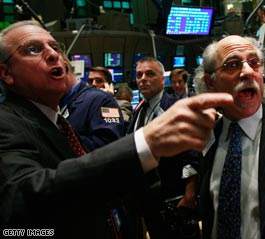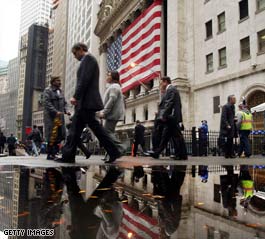Wind Energy Companies
A Snapshot of the Global Wind Industry
By Nick Hodge
Tuesday, August 26th, 2008
I've discussed wind energy in these pages many times before, but the conversation seems to have always turned to a discussion of wind turbine stocks.
Today, I want to take a step back, look at the industry as a whole, and focus more broadly onwind energy companies.
The Wind Energy Industry
First, let's get a quick rundown of the growth of the domestic and international wind markets out of the way.
Here's the chart for wind power capacity growth by year:

As you can see, global installed capacity for wind energy has grown 482% over the last seven years, from 14,604 MW in 2000 to 84,934 MW in 2007.
Broken down further, the international wind industry has a compounded annual growth rate (CAGR or year-over-year) of 28.6%, which is impressive, to say the least.
But the past performance of the wind energy stocks is going to do little to help the future performance of your portfolio, apart from establishing an historic trend and highlighting what you've been missing.
So here's the global wind energy installed capacity forecast, going out to 2012:

This data reveals that the industry will grow 215% between 2007 and 2012, from 84,934 MW to 267,837 MW. That's a CAGR of 25.8%
Now this is information that can give your portfolio a boost. In an industry that's doubling in size every four years or less, there are surely more than a few companies worthy of investment operating within it.
The only thing left to do is to actively seek out the best ones.
To start the search, it's probably worth taking a look at the countries currently boasting the highest year-over-year growth in the wind industry. So here they are, along with their respective annual growth rates, as provided by GlobalData:
Turkey, 95.4%
Mexico, 84.7%
Brazil, 61%
China, 54%
Poland, 50.9%
Of course, those are the fastest growing markets. According to GlobalData, the largest markets by megawatt capacity are:
China, 51,200 MW
U.S, 45,454 MW
Spain, 36,715 MW
Germany, 35,829 MW
India, 25,935 MW
The only thing left to do is single out the largest operators in those areas, invest, and reap the profits.
Wind Energy Companies
Let's begin with China since that's the only country to appear in both the largest market and fastest grower categories. Per GlobalData, here are the largest wind companies operating in China that each installed more than 100 MW in 2007:
Goldwind Science and Technology (SZ: 002202)
Sinovel Windtec Co.
Gamesa Corporacion Tecnologica (MCE: GAM)
Vestas Wind Systems (CPH: VWS)
Dongfang Electric Corporation (HKSE: 1072)
GE Energy (NYSE: GE)
Suzlon Energy Limited (NSE: SUZLON)
Most of those companies trade on foreign exchanges. If you dabble in those markets, my money is on Vestas and Gamesa, with Suzlon in third. But the companies that trade in China could see significant growth as the industry continues to mature.
Vestas, for example, is getting $1,628 per kW for their turbines. The average price is $1,008 per kW.
In the U.S., which is the market most of you are probably interested in, the dynamic shifts dramatically.
Here are the largest companies operating in our domestic wind market:
GE Energy (NYSE: GE)
Vestas Wind Systems (CPH: VWS)
Siemens AG (NYSE: SI)
Gamesa Corporacion Tecnologica (MCE: GAM)
Mitsubishi Heavy Industries (TYO: 7011)
Suzlon Energy Limited (NSE: SUZLON)
Clipper Windpower (LSE: CWP)
Nordex (FRANKFURT: NDX1)
Of course, my first two picks of Vestas and Gamesa still stand, and now you can see it's because of their intense presence across multiple markets. My sleeper pick here is Nordex.
The other side of the coin is to look at the largest wind farms being erected to identify the companies involved. Here are the companies that come up when discussing the largest planned wind farms in the U.S., and around the world:
Clipper Windpower (LSE: CWP)
British Petroleum (NYSE: BP)
Naikun Wind (TSX.V: NKW)
Vattenfall AB
SUEZ (PARIS: SZE)
RWE Group (XETRA: RWE)
Naikun probably offers the lowest share price in relation to potential for that group.
A Windy Future
So that's a snapshot of the global wind industry. I think some clear winners are definitely emerging.
But there is much more to come. And some tiny companies will certainly make their mark before all is said and done.
This is because the big boys alone can't satiate the surging demand for wind energy and related products and services.
For example, through 2020 in Europe, wind is expected to account for 34% of new generating capacity. It'll account for 46% from 2020-2030.
And the goal of attaining 12-14% of Europe's power from wind by 2020 is well within reach.
Here in the U.S., an Energy Department study found that wind energy could generate 20% of U.S. electricity by 2030, as compared to today's one percent.
So there's still a lot of work and investment to come.
The companies discussed so far will certainly play a vital role in wind's growth. But a handful of companies are providing specialty parts and service that are also crucial to the industry, like transmission cables, installation services, gearboxes, and, increasingly, turbines.
As I said, this is snapshot of the industry—a very dynamic industry that's constantly changing.
While it's possible to base investment decisions on stationary data like this, it's probably wise to have constant updates and recommendations to really stay on top of things, especially since they change everyday.
With that in mind, the Alternative Energy Speculator has designed a way for you to cash in on the booming wind energy market.
I've compiled a full report that analyzes the wind industry, telling you exactly how much it's going to grow, and releasing the names of three companies you must own if you want to reap lucrative wind profits.
You can't afford to miss this opportunity or the chance to get in today on the wind energy giants of tomorrow.
'Business' 카테고리의 다른 글
| Top 100 Dividend Stocks (1) | 2011.04.29 |
|---|---|
| FACEBOOK & E HARMONY & TWITTER PRIVATE STOCKS!!!! (0) | 2009.08.18 |
| 10 Secrets of Millionaires' Money Management (0) | 2009.04.18 |
| 15 Failed Predictions about the Future (0) | 2009.04.16 |
| Nintendo motion control accessory to launch June 8 (0) | 2009.04.14 |







